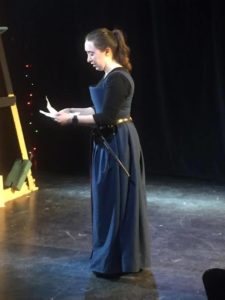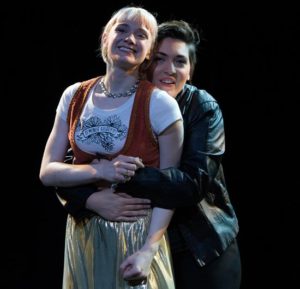Make Shakespeare gay again! The perfectly timed hangtag for Theatre Prometheus’ latest production from the Bard’s canon, [gay] Cymbeline. The company as a whole, though only entering their fourth year, lives up to their motto— “we bring the fire.” For not only do they boldly and daringly swap around the genders in William Shakespeare’s Cymbeline to present a lesbian love story, but their judiciously rendered production actually makes the plot palatable and sensible! If that’s not bringing the fire, I don’t know what is! Directed by Tracey Erbacher, this evocative approach to one of Shakespeare’s “challenge plays” (not quite a lost play, not quite a comedy, tragedy, or history, but overall problematic) presents a topical relevance to our political world at large, carefully examining relationships and love as well as investigating the dynamics of war, tragedy, farce, and comedy, all in one tightly-wound, action-packed, and exceptionally accessible performance.

At first glance, it would appear— the relabeling of the title on the program excepted— that one would be in for an ordinary afternoon of Cymbeline. A standard Shakespeare set in an ordinary black box space with a pretty painted proscenium arch (Scenic and Lighting Designers Eric McMorris and Yannick Godts) and sprightly snippets of music (by way of Sound Designer Patrick A. Lachance and Musical Director Sarah Davis) from the regal court is what greets the eye and the ear. But be not fooled by this façade as Director Tracey Erbacher has something more diabolical and energetic stuffed up her sleeves. The play gets underway and although the proscenium arch remains affixed to its standing, the syrupy classical tones go way of the dodo in favor of modern covers of poignant and smartly assigned music to further heighten the reality of the situation. Assisting in this matter, Sound Designer Patrick A. Lachance delves unapologetically into modern song snippets that reflect what’s happening in various scenes, and uses those samplings to cover scene change. There are other clever uses of music fixed in place by Musical Director Sarah Davis, the keenest coming to mind being when Cloten takes to his acapella and “air-mic” version of Oasis’ “Wonderwall.”
McMorris and Godts do more than just make the proscenium arch look pretty. It’s their intentional use of natural lighting that drives home a sense of authenticity in the production. McMorris and Godts have a striking way of calling the audiences’ attention to critical moments of emotional eruption and catharsis. This is particularly true for at least two instances when Posthumus finds herself alone on stage in mind-blurring confession and acceptance. The tight white focused light and use of shadow-play here enhances the emotional investment which the actress pours into the scene.
Wrapping her mind fully around a hybrid fusion of “then-and-now”, Costume Designer Kristina Martin executes a blend of traditional Shakespearean garb against modern rebellious grunge in her sartorial selections and the look is both unique and functional. The screen-print t-shirts on the younger generation of characters balances out the notion of era-appropriate accoutrements, drawing a physical representation to the notion of “what was happening then is still relevant now.” Martin should also be commended for the fancier costumes, featured mainly on the Queen and in the glimmer of Imogen’s skirt.
Director Tracey Erbacher has primed the audience for a hearty conversation about gender politics in Shakespeare and has shed light on gender equality by transitioning the character of Posthumus from male to female, identifying her as Imogen’s wife, and furthering the scrutiny of forbidden love in this production. While this is a fantastically deliberate choice (it broadens the scope of interpretation and ultimately allows for the plot’s entirety to make more sense), it brings to light a different question: is there a place for gender-blind casting in a production where specific gender roles have been intentionally subverted and replaced for the sake of making a point? Ultimately all ten performers do an astonishing job playing just under two dozen characters (with three of the performers only ever playing one character), it does cause one to wonder if the ultimate message of gender equality and equality for sexual identity could not then have been strengthened if the rest of the roles were cast according to their written genders.
Erbacher’s modernization of the piece, though delivery of the text is true and emphatically expressed by performers who have a clear concept of how to deliver the words of the Bard, gives the narrative a gritty edge. This enhances the experience, particularly during moments when little expletives erupt from the mouths of various characters, reminding us of their humanity and fallibility, something that is often overlooked in these character-constructs-turned-titans simply because they were birthed of the brain of Shakespeare. In addition to this layer of experience, Erbacher understands how to pace the show, driving it forward to keep the audience’s interest. This, combined with her precision edits to the story, so that nothing feels lost or forgotten without bogging down the audience in subplot and minutia, is what effectively renders [gay] Cymbeline as impactful and effective.
Praise must be lauded to Fight Choreographer Megan Behm, whose clanging and slashing sword work is an extra explosion of excitement in the production. The sword fights have an authentic feel to them, particularly the clashing brawl between Posthumus and Iachamo. They move about almost in a Jedi-Knight battling fashion, with reverent fury channeled in solidarity toward one another. Behm, who keeps the fight choreography well-paced, authentic-looking, and still safe for the actors, is an integral part of the show’s overall success.

Performances shared across the ten-person ensemble are stellar, both in their modernization of tone and approach to accessibility for those who do not have as a firm a grasp on the Bard’s archaic language. The dectet of individuals works like a well-oiled machine inside this conceptualization of Cymbeline and strives, with great success to deliver an undiluted plot and key moments of excitement for the audience. Performers like Rachael Murray, who doubles as Helen— a servant— and Cornelia— a doctor— finds cheeky and clever ways to work these characters into a frothy humor, be it through her antics with hauling furniture as Helen or her perfectly-timed delivery of news at the show’s conclusion as the doctor.
Christopher Holbert takes up the dual role of a Roman gentleman but more notably King Cymbeline, and delivers the monarch with a brutal nature that makes it easy to dislike him and his discourse in the earlier scenes of the production. Appearing infrequently on the stage, Holbert makes the character transition in the King quite apparent, taking him from a calloused and unaccepting individual into something open and welcoming by show’s end, which is a delightful moment to witness as the nonsense of the show comes to rights and sorts itself out.
A versatile Renae Erichsen-Teal does profound justice to the double-casting choice of Queen and Belarius. Showcasing similarities in their personalities, Erichsen-Teal plays both women as strong characters show persevere and thrive regardless of their circumstance, one in a vein of malice and corruption, the other with a humbled reverence for survival. Erichsen-Teal’s Queen is unsavory, two-faced at the best of times, and delivered with a full emotional body when it comes to displaying her cunning nature in asides to the audience. Her Belarius is a much more noble creature, despite her banishment, and seeing her flip from one to the other is a reward in itself.
So too, humble and grounded, are the characters of Polydore (Renea Brown) and Cadwal (Mollie Goff.) Both Brown and Goff take up earlier incarnations during the production, with both of them playing buffoonish Lord Companions to the arrogant Cloten, and Goff also posing as a Frenchman residing in Italy. Brown’s finest work is delivered in her saucy but sincere portrayal of Polydore. The sword-fight and build up to said battle, with Cloten (Zach Boylan) is one of the highlights of the second act of the production. Boylan, who isn’t afraid to caricaturize Cloten into a boorish, frat boy with cocksure and unwavering confidence, despite his whiny tendencies, does a remarkable job of making this character of great nuisance stand apart from his lesser noted, but warmly received Captain of the British Army.
Though Boylan has antagonistic qualities in his portrayal of Cloten, it’s Jonathan Rizzardi and his seedy and rather unsavory approach to Iachomo that makes the skin crawl when he graces the stage. A wildly seductive creature that shows no qualms slinking about like a serpent waiting to strike— not unlike the way Erichsen-Teal treats her Queen character— Rizzardi possesses an oily unction about his character that slides salaciously into the tangled plot of betrayal and deception with grotesque fluidity. Channeling a bull peacock, with arrogance in his strut and temper informing his physicality, Rizzardi makes for a delightfully devious and villainous knave.

Starting the play as a Prologuette of sorts, Jacqueline Chenault quickly finds her footing as the servant of two masters, Pisanio. With a pointed comic wit, Chenault’s prologue to the play shows that she’s the master cat-wrangler and gets the audience primed for a healthy bout of shenanigans. In the play itself, Chenault’s character work is well-balanced, the time spent devoted to both masters, as well as flummoxed over what to do when the situation gets dicey from either end is as prevalent as her ability to crack wise when the situation calls for it. Serving as a two-in-one Virgil and Fool, both guide and entertainment, Chenault brings the show together like the ribbon on a shiny Shakespearean present.
Two women in love, what’s wrong with that? The question that motivates “make Shakespeare gay again” comes down to Imogen (Caitlin Partridge) and Posthumus (Briana Manente). It becomes almost impossible to discuss one without the other as these two actors entwine the characters in an irresistibly inseparable fashion. The strong emotional tether forged in love that binds them makes the varying twists in the plot all the more brutal and the ending that much more rewarding. Manente and Partridge display a genuine chemistry and fondness for one another in these roles and result is delightful when they play out their scenes together on stage.

Manente is quite visceral, particularly when expressing her furies, wounds, rages, and upsets. The harrowing breakdown of utter bewilderment, which quickly funnels itself into an inferno of scorned heartache and avowed vengeance, that Manente delivers upon fearing she has lost her true love to conniver Iachomo is beyond words; this is one of the most emotionally expressive moments in the production. Partridge, who all but melts into irredeemable sorrow upon learning similar false news, is of a similar persuasion when it comes to emotional honesty and clarity. Manente tends to favor her full body as an expressive extension of her emotional turmoil while Partridge rests heavily on her animated facial features. The one coming to mind most clearly is the wrinkled revolt of utter repulsion, like stepping barefoot on a garden slug, when being advanced upon by Cloten. Partridge’s most responsive moments are often in moments of reactionary listening, again with vividly animated facial features like in moments when Iachamo is slathering her ears with salacious slander.
Hop on the bandwagon; boldly put your equality opinions out there alongside Theatre Prometheus; make Shakespeare gay again!
Running Time: 2 hours and 10 minutes with one intermission
[gay] Cymbeline plays through January 29, 2017 with Theatre Prometheus at The Anacostia Arts Center— 1231 Good Hope Road SE, Washington DC. Tickets are available for purchase at the door or in advance online.

